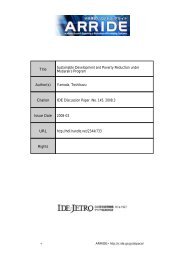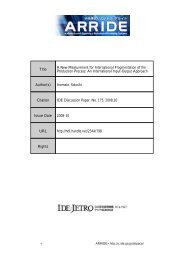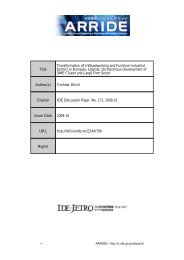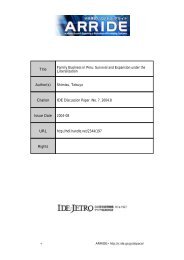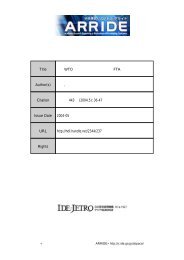Title Financing Small and Medium Enterprises in Myanmar Author(s ...
Title Financing Small and Medium Enterprises in Myanmar Author(s ...
Title Financing Small and Medium Enterprises in Myanmar Author(s ...
You also want an ePaper? Increase the reach of your titles
YUMPU automatically turns print PDFs into web optimized ePapers that Google loves.
Twenty-seven bus<strong>in</strong>esses surveyed responded that they had to acquire loans not<br />
only from banks but also from their personal network, such as their relatives <strong>and</strong><br />
friends, for additional f<strong>in</strong>anc<strong>in</strong>g requirements. For these loans, they had to pay a higher<br />
<strong>in</strong>terest rate. Normally, the <strong>in</strong>terest rate is 5 percent per month if the lend<strong>in</strong>g party is<br />
the person who has close relationship with borrowers. Otherwise, if they borrowed from<br />
outside money lenders (gray market), they would have to bear higher <strong>in</strong>terest rates that<br />
would usually go up to 10 percent to 20 percent.<br />
At present, the most prevalent <strong>and</strong> available form of f<strong>in</strong>anc<strong>in</strong>g for SME owners is<br />
trade credit from suppliers, especially from those <strong>in</strong> the same l<strong>in</strong>e of bus<strong>in</strong>ess. In the<br />
trad<strong>in</strong>g of rice, wheat, beans, <strong>and</strong> pluses, as well as <strong>in</strong> the distribution of consumer<br />
goods from manufactures to wholesalers <strong>and</strong> from wholesalers to retailers, the practice<br />
of pay<strong>in</strong>g cash down payment is very rare. In consumer goods distribution, buyers pay<br />
<strong>in</strong> cash only dur<strong>in</strong>g second delivery of the products. In some cases, this second delivery<br />
can be extended up to one month. In the same ve<strong>in</strong>, manufacturers who distribute their<br />
products on credit term also purchase raw materials on credit from their suppliers. The<br />
average credit term is one month <strong>in</strong> most bus<strong>in</strong>esses, but <strong>in</strong> some bus<strong>in</strong>esses, it can be<br />
longer. Bus<strong>in</strong>essmen <strong>in</strong> the same l<strong>in</strong>e of bus<strong>in</strong>ess quite know each other so bus<strong>in</strong>ess<br />
transactions are done by mutual trust without formal documents on receiv<strong>in</strong>g <strong>and</strong><br />
deliver<strong>in</strong>g goods <strong>and</strong> cash payments. This practice can even be observed <strong>in</strong> bus<strong>in</strong>esses<br />
where the volume of transaction <strong>and</strong> the amount of money circulated is hefty, such as is<br />
bean <strong>and</strong> plus trad<strong>in</strong>g, gold <strong>and</strong> gems trad<strong>in</strong>g, etc.<br />
From the perspective of banks, lend<strong>in</strong>g to SMEs is too risky. This is because of<br />
their bitter experience <strong>in</strong> the past on giv<strong>in</strong>g loans to SMEs. Accord<strong>in</strong>g to a bank<br />
manager from the <strong>Myanmar</strong> Economic Bank (MEB), which is the largest state-owned<br />
banks, made available a vast amount for loans to SMEs around 1996 when the private<br />
sector was <strong>in</strong> a boom the first time. At that time, banks did not have enough experience<br />
<strong>in</strong> provid<strong>in</strong>g loans to private sector <strong>and</strong> were not familiar with lend<strong>in</strong>g techniques. Also,<br />
the regulations by the central bank were somewhat relaxed at that time. Borrow<strong>in</strong>g<br />
from banks even turned <strong>in</strong>to a bus<strong>in</strong>ess opportunity between bus<strong>in</strong>essmen who wanted<br />
to borrow <strong>and</strong> freelance agents who had connections with the banks. This situation<br />
resulted <strong>in</strong> many people arbitrarily sett<strong>in</strong>g up bus<strong>in</strong>esses only with the <strong>in</strong>tention of<br />
acquir<strong>in</strong>g loans from banks. Bus<strong>in</strong>ess owners could easily access bank loans with the<br />
help of freelance agents <strong>and</strong> by offer<strong>in</strong>g their l<strong>and</strong>s <strong>and</strong> build<strong>in</strong>gs as collaterals, even<br />
though they did not know anyth<strong>in</strong>g about bank<strong>in</strong>g procedures. The agent would only<br />
make m<strong>in</strong>or repair works on the exteriors of a collateral build<strong>in</strong>g to deliberately create a<br />
perception that the build<strong>in</strong>g was more valuable than its actual value. He or she would<br />
then take photos of the build<strong>in</strong>g, fill out the loan application form, <strong>and</strong> submit it to the


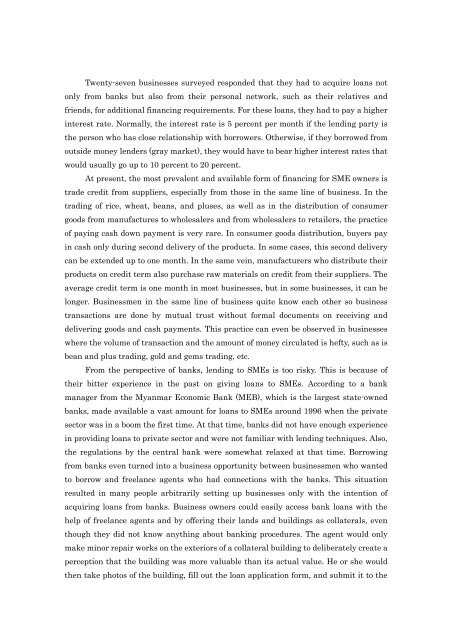
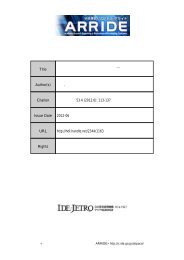
![Title [書評] 廣田義人著『東アジア工作機械工業の技術形成 ... - ARRIDE](https://img.yumpu.com/47139953/1/184x260/title-arride.jpg?quality=85)
